Sacagawea Dollars with an Experimental Finish
As featured in the June 25th Issue of Coin World (pgs. 3 & 18)
and the June 5th Issue of Numismatic News (pg. 4)

We are very excited to announce that we have just purchased a small group of 2001-P Sacagawea Dollars that were struck with an experimental rinse by the U.S. Mint in Philadelphia.
This experimental rinse/finish attracted much attention when it was discovered on 2001-P Sacagawea Dollars. Coin World attempted to contact the Mint to get the details on this experimental process, but Mint officials refused to comment. The June 25th Issue has a detailed article on this discovery.
This discovery is also featured in Numismatic News in their June 5th Issue. They were the first to report on these experimental Sacagawea Dollars. CoinFacts.com, one of most popular online coin references, is featuring the Experimental Sacagawea Dollar as their "Coin of the Week".
As everyone knows, the year 2000 Sacagawea Dollars, which was the first year of issue, were plagued with spots, discoloration, and tarnish, even when pulled from bags or rolls from the bank.
The Sacagawea Dollar has an alloy layer on each side of the copper core. These two layers are manganese bronze, a composition the U.S. Mint has not used since Wartime Nickels were being struck in the early 1940's. The Mint experienced many problems with the Wartime composition, which peeled, laminated and was not mixed properly.
A similar situation occurred in 1999, when the Mint was experimenting with the composition, layers and finish for the alloy to be used for the Sacagawea Dollar. The end result was an overall composition of 88.5% copper, 6% zinc, 3.5% magnesium and 2% nickel.
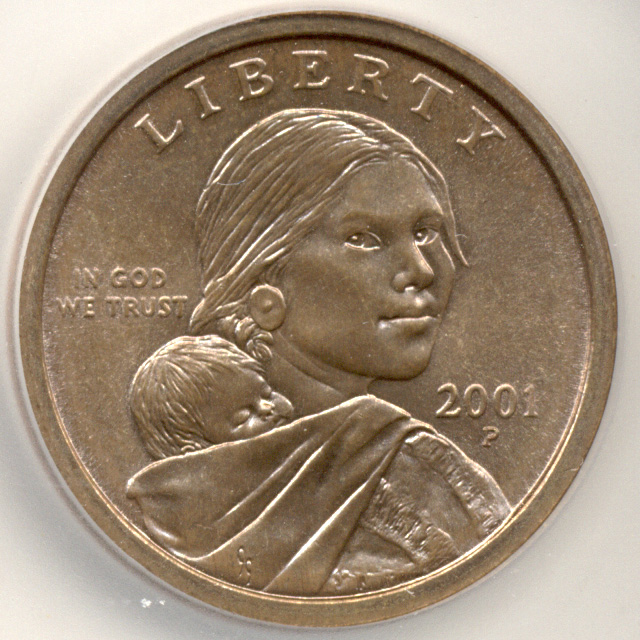
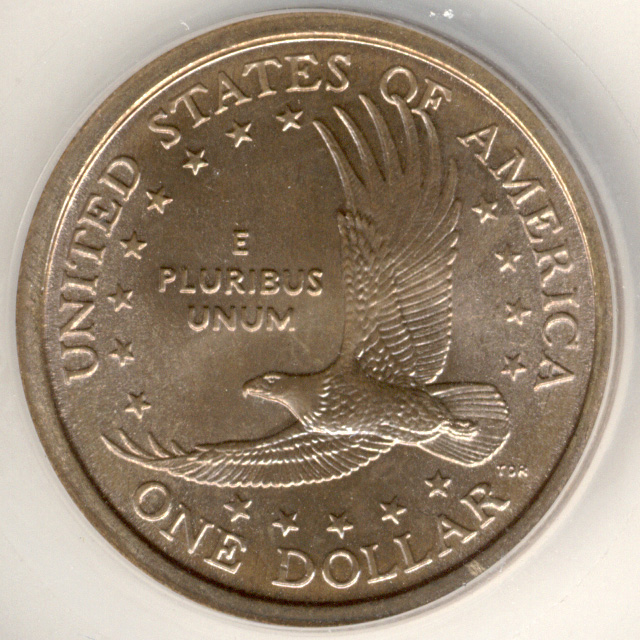
There have been several articles in Coin World in the last year which have described in detail the problems that the U.S. Mint was having with the composition and finish of the new Sacagawea Dollar. In one of the articles, Michael Fahey of ANACS describes the finishing process for the burnished Sacagawea Dollars, explaining that the rinse was "used to remove any surface residue from the coins, and to prevent spotting."
Recently on the Discovery Channel, there was a program exclusively devoted to the U.S. Mint and the production of United States coinage. In this film, viewers got a close up look at the entire minting process. This program included an interview with the Mint Director regarding the new Sacagawea Dollars. It also elaborated on the tests and experiments that were conducted by the Mint on this new alloy for the Sacagawea Dollar. Small quantities of planchets and struck coins were subjected to chemical testing, exposure to artificial sweat, mechanical wear and tear, artificial wear and electrical testing.
Knowing that the Sacagawea Dollar in it's first year of production was plagued with these problems, the U.S. Mint continued to experiment and conduct tests on the surface with chemicals and rinses to ensure that future years of production would not have similar problems. This small hoard was discovered through the normal distribution channels by an alert employee/collector who instantly noticed that these were different in color, appearance and texture. This individual contacted David Hendrickson of Silver Towne, one of the largest coin dealers in the Mid-West, and subsequently sold these discovery pieces.
Silver Towne immediately contacted our firm, since we specialize in Major Mint Errors and are well known throughout the industry. This group was then authenticated and certified by SEGS (Sovereign Entities Grading Service) as having an Experimental Rinse. SEGS is one of the leading certification and grading services. One of their specialties is Major Mint Errors. Larry Briggs, the owner of SEGS, is a highly respected numismatist. After an unsuccessful attempt at reaching the Mint for comment, Larry Briggs consulted with several Mint Error specialists and determined that "these coins were the result of an experimental rinse or finish."
Another world-renowned Mint Error expert, Fred Weinberg, has examined some of these experimental pieces and agreed that they have "an experimental rinse or finish." This rinse/finish was applied by the United States Mint to hopefully eliminate the spots and discoloration.
These Experimental Sacagawea Dollars are being sold exclusively by Mike Byers of Mike Byers Inc. and are available only through www.mikebyers.com, the company's website. These authenticated and certified experimental pieces have been graded Mint State 64 to Mint State 67 and are priced between $150 and $300.
This experimental dollar belongs in every collection of Mint Errors, Patterns and/or Dollars. It certainly belongs with other Sacagawea Dollars that were specially struck and/or have experimental/different finishes.
On November 18, 2000 the United States Mint struck approximately six hundred Sacagawea Dollars on a special press for dignitaries, collectors, and other invited guests. These special presentation strikes are referred to as VIP strikings and have sold on eBay for $600.
Glenna Goodacre, who was the designer of the obverse for this new dollar, was paid by the U.S. Mint in the form of five thousand Burnished Sacagawea Dollars. These Burnished specimens were certified by ICG and sell on eBay in the $500-$600 range. ICG certified all five thousand of these Burnished Dollars with this special surface.
VIP Striking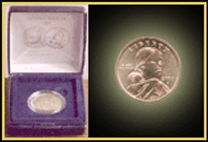 Quantity Struck: 600 SOLD OUT |
Burnished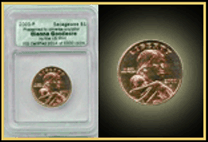 Quantity Struck: 5000 Certified with No Grade SOLD OUT |
Experimental Finish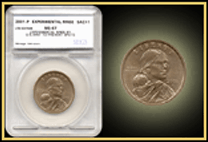 Quantity Struck: Limited Edition SOLD OUT |
This group of several hundred Sacagawea Dollars have been authenticated and certified by SEGS as a limited edition, with an experimental rinse/finish. These are available exclusively through Mike Byers Inc.
This discovery is significant because it represents a third type of special Sacagawea Dollars struck by the U.S. Mint. These are priced at just a couple hundred dollars and compare favorably in rarity to the VIP and Burnished Sacagawea Dollars.



